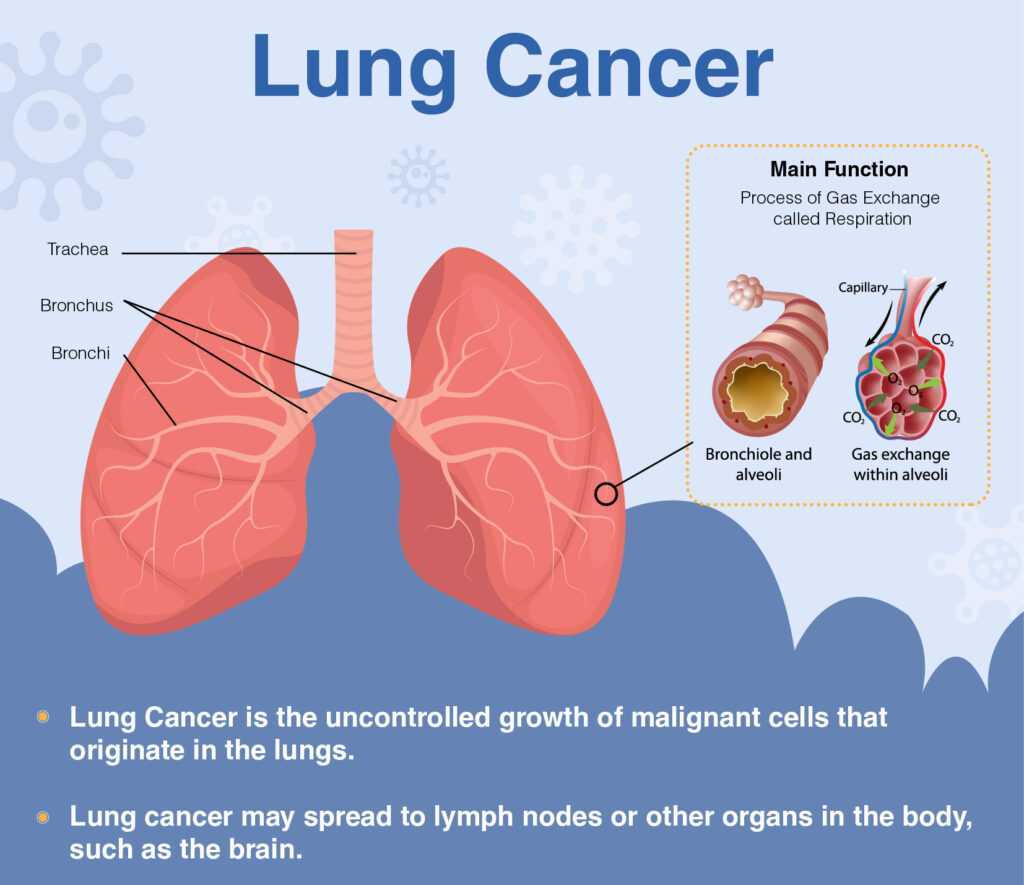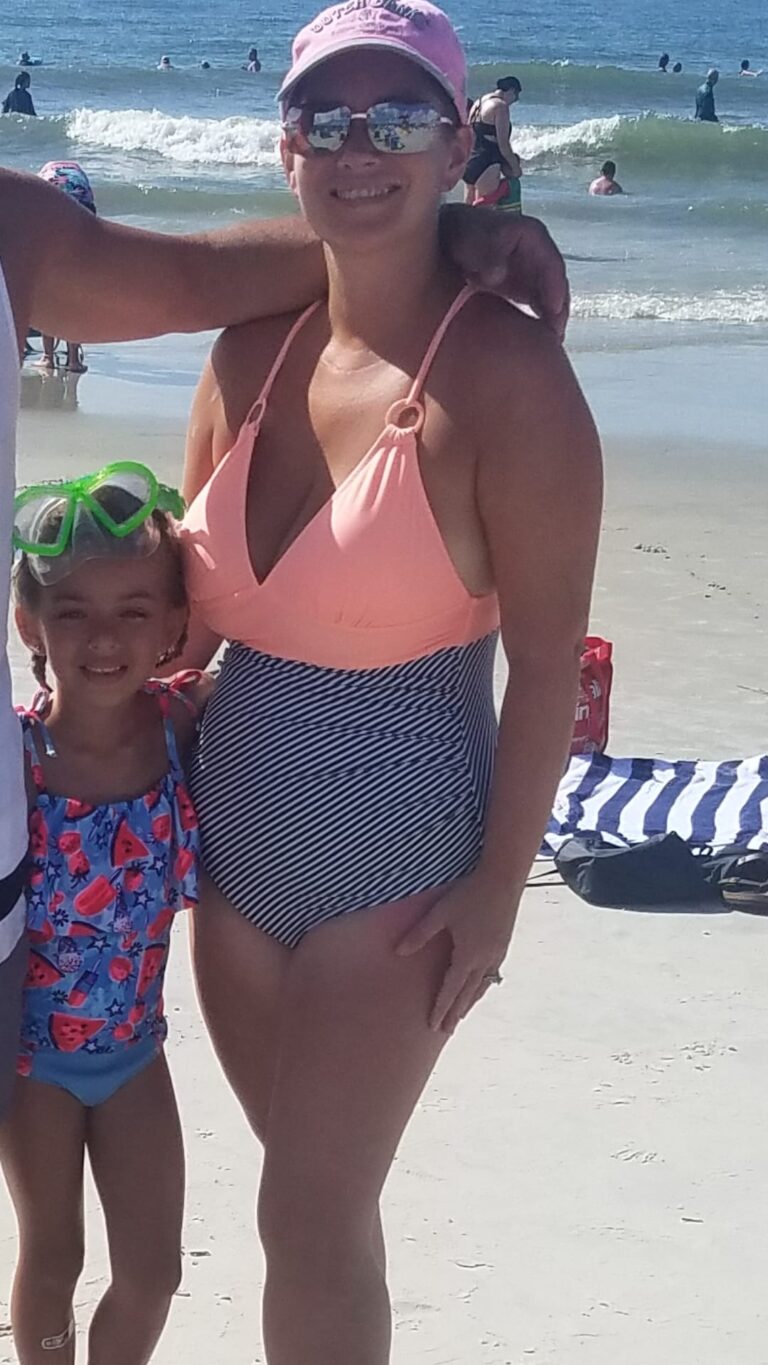Lung Cancer
Lung Cancer
Lung cancer is a type of cancer that begins in the lungs. It is the leading cause of cancer deaths worldwide. People who smoke have the greatest risk of lung cancer, though it can also occur in people who have never smoked. The risk of lung cancer increases with the length of time and number of cigarettes you have smoked. If you quit smoking, you can significantly reduce your chances of developing cancer. Unfortunately, symptoms are usually not present until the cancer has advanced.
Symptoms
- a new cough that doesn’t go away
- coughing up blood
- fatigue
- losing weight without trying
- hoarseness
- bone pain
- shortness of breath
- chest pain
- headache
Causes
Lung cancer is mostly caused by smoking; both in smokers and in people exposed to secondhand smoke. It can also occur in people who have never smoked or had an exposure to secondhand smoke. In these rare cases, there may be no clear cause of cancer in these patients.
How smoking causes lung cancer
Research shows that smoking causes lung cancer by damaging the cells that line the lungs. Cigarette smoke is full of cancer-causing substances. Once this is inhaled the changes in the lung tissue begin almost immediately. In the beginning, your body may be able to repair this damage. But with each repeated exposure normal cells that line your lungs are being damaged.
Types of lung cancer
It divided into 2 major types based on the appearance of cancer cells under a microscope. The doctor will make treatment plans based on which type of cancer you have,
- Small cell lung cancer- less common, is almost exclusively in heavy smokers
- Non-small cell lung cancer- is a term for several types such as squamous cell carcinoma, adenocarcinoma and large cell carcinoma
Risk factors
- Smoking. Your risk of cancer increases with the number of cigarettes you smoke each day and the number of years you have smoked. In the US, cigarette smoking is linked to 80-90% of lung cancer deaths. People who smoke cigarettes are 15 to 30 times more likely to get lung cancer than people who do not smoke.
- Exposure to secondhand smoke. Smoke from cigarettes, pipes or cigars also cause cancer.
- Previous Radiation Therapy. If you have undergone radiation therapy to the chest for another type of cancer you have an increased risk of developing lung cancer
- Exposure to radon gas. Radon is produced by the natural breakdown of uranium in soil, rock and water. It will eventually become part of the air you breathe. Unsafe levels of radon can accumulate in any buildings or homes. Radon is the second leading cause of lung cancer in the US.
- Exposures to asbestos or carcinogens. Workplace exposures to asbestos and other substances can increase your risk, especially if you are a smoker.
- Family History of lung cancer. People with a parent, sibling or child with lung cancer have an increased risk of the disease
Stages of lung cancer
- Stage 0:Your tumor is very small. Cancer cells haven’t spread into your deeper lung tissues or outside your lungs.
- Stage 1: Cancer is in your lung tissues but not your lymph nodes.
- Stage 2: The disease may have spread to your lymph nodes near your lungs.
- Stage 3: It has spread further into your lymph nodes and the middle of your chest.
- Stage 4: Cancer has spread widely around your body. It may have spread to your brain, bones, or liver.
How to diagnose
If you suspect lung cancer there are tests that can be performed such as;
X-Ray: it may reveal an abnormal mass or nodule
CT scan: can reveal masses and nodules that an X-Ray may not
Sputum Cytology: if you have a cough and are producing sputum, looking at the sputum under a microscope can detect lung cancer
Tissue sample: your doctor might do a biopsy to check for abnormal cells
PET scan: this test is done usually after a cancer diagnosis; this test will tell if the cancer has spread
Complications
- Shortness of Breath
- coughing up blood
- pain
- pleural effusion( fluid in chest cavity)
- metastasis (cancer spreading to other parts of the body)
Once lung cancer has spread beyond the lungs, it is generally not curable. Treatments are available to decrease signs and symptoms and to help live longer.
Treatments
- Surgery. Sometimes the doctor will suggest to remove part of the lung if the cancer is confined to the lung.
- Radiation. uses high-powered energy beams from sources such as X-rays and protons to kill cancer cells. During radiation therapy, you lie on a table while a machine moves around you, directing radiation to precise points on your body.
- Chemotherapy. Chemotherapy uses drugs to kill cancer cells. One or more chemotherapy drugs may be given through a vein in your arm (intravenously) or taken orally. A combination of drugs usually is given in a series of treatments over a period of weeks or months, with breaks in between so that you can recover.
- Immunotherapy .Immunotherapy uses your immune system to fight cancer. Your body’s disease-fighting immune system may not attack your cancer because the cancer cells produce proteins that help them hide from the immune system cells. Immunotherapy works by interfering with that process.
- Palliative Care. People with lung cancer often experience signs and symptoms of the cancer, as well as side effects of treatment. Supportive care, also known as palliative care, is a specialty area of medicine that involves working with a doctor to minimize your signs and symptoms.
My Personal Story
My mother passed away from lung cancer in July 2019 at the age of 69. Here is her story.
My mother was a heavy smoker since she was a teenager (over 40 years). In October 2018, my mother had a cough that just would not go away. She refused to go to the doctor. After a few conversations she agreed to go to urgent care. She called me after she left urgent care and said that they did a CT scan and they saw something and she needed to follow up with a pulmonologist.
Her Story
I called a pulmonologist and made an appointment for her. I viewed her discharge papers from urgent care the next day. The CT scan showed a 5cm mass in her lung. I knew that this was not good. I took her to the doctor and he stated that since she was a smoker, had a mass in her lung and had lost weight; she most likely had lung cancer. Her next step was a biopsy.
She had the biopsy done and it was found to be malignant. We were devastated. I took her to an oncologist 2 weeks later. A PET scan was done. It was in her lymph nodes. She was diagnosed with Stage 3. The treatment plan was chemo and radiation. The oncologist did not give us a life expectancy. She said every case is different.
Treatment
Unfortunately, my mom did not tolerate the chemo very well. It made her sick. Her blood pressure was too low and she lost more weight. She eventually stopped eating. We tried ensure and boost drinks to help keep her hydrated. By July 2019, she was bedridden and was wearing diapers. She slept 90% of the day and was barely 90 lbs. It was so horrible to see her suffer. The doctor said we should stop all treatments and start hospice.
After careful consideration we decided to stop treatment and start hospice. Within 2 weeks of hospice she passed away in the comfort of her family in her own home. Lung cancer is not something to take lightly.

Coping Mechanisms for losing a parent
Do you know anyone who was diagnosed? How did you handle it ?









